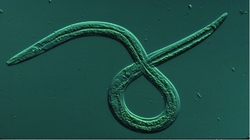Home > R&D Projects > Transcriptomics > Bursaphelenchus xylophilus
|
POINTERS - Host tree-pinewood nematode interactions: searching for sustainable approaches for pine wilt disease management
|
|
Comparative omic tools for the study of the pinewilt nematode pathogenicity |

|
The pinewood nematode (PWN), Bursaphelenchus xylophilus, causal agent of the pine wilt disease (PWD), is considered a threat to forestry ecosystems. Its pathogenicity is not fully elucidated and innovative, holistic strategies are needed to understand the infection process. Proteomics is a powerful tool that can help understanding the metabolic pathways involved in PWN pathogenicity and also in tree resistance. It is known that PWN secreted proteins are crucial for its pathogenicity, but it is important to investigate the PWN secretome in pine species with contrasting susceptibilities and the proteome of infected and elicited trees. The knowledge on elicitors as activators of tree defenses can also contribute to identify metabolic pathways involved in resistance. This multidisciplinary project will shed light into nature and functions of PWN pathogenicity proteins and tree resistance mechanisms, and will develop sustainable and practical elicitor-based strategies for PWD management. This project gathers research teams from the University of Coimbra, Centro de Neurociências e Biologia Celular and Universidade Católica Portuguesa. |
|
|